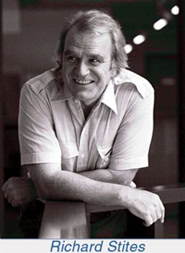 The Department of History at Georgetown University is very sad to report that Professor Richard Stites (who held a joint appointment in the School of Foreign Service and also taught in the Center for Eurasian, Russian, and East European Studies at Georgetown) passed away on Sunday, March 7, 2010, while on research leave in Helsinki, Finland, following a relatively brief illness.
The Department of History at Georgetown University is very sad to report that Professor Richard Stites (who held a joint appointment in the School of Foreign Service and also taught in the Center for Eurasian, Russian, and East European Studies at Georgetown) passed away on Sunday, March 7, 2010, while on research leave in Helsinki, Finland, following a relatively brief illness.
Richard Stites was a proud native of Philadelphia, where he was born December 2, 1931. He received his BA in history from the University of Pennsylvania in 1956, his MA in history from George Washington University in 1959, and his PhD in Russian history from Harvard University in 1968. Richard Stites taught at Lycoming College in Pennsylvania, the International College in Copenhagen, Brown University, and The Ohio State University’s Lima campus before joining Georgetown University’s faculty in 1977. He read and/or spoke nine languages apart from English.
Stites specialized in modern Russian cultural and social history. His extraordinarily long list of influential publications includes scores of articles, at least five edited or co-edited volumes, a major co-authored textbook, A History of Russia: Peoples, Legends, Events, Forces (Houghton-Mifflin, 2004), and the following single-authored books: The Women’s Liberation Movement in Russia: Feminism, Nihilism, and Bolshevism, 1860–1930 (Princeton University Press, 1978; 2nd ed. 1991); Revolutionary Dreams: Utopian Vision and Social Experiment in the Russian Revolution (Oxford University Press, 1989; 2nd ed. 1991); Russian Popular Culture: Entertainment and Society since 1900 (Cambridge University Press, 1992); and Serfdom, Society, and the Arts in Imperial Russia: The Pleasure and the Power (Yale University Press, 2008). Revolutionary Dreams won the 1989 Wayne S. Vucinich Prize of the American Association for the Advancement of Slavic Studies. At the time of his death, he was in the final stages of completing yet another major manuscript: The Four Horsemen: Revolution and Counter-revolution in Post-Napoleonic Europe.
Richard Stites won research awards and fellowships from the Russian Research Center at Harvard, the Kennan Institute for Advanced Russian Studies, the Guggenheim Foundation, the Harriman Institute for the Advanced Study of the Soviet Union, and the National Endowment for the Humanities. He was selected for numerous IREX exchanges with Russia, he taught for a time at the U.S. Army Russian Institute in Garmisch-Partenkirchen, Germany, and he was Fulbright Professor at the University of Helsinki in 1995. In 2003, he was awarded an honorary doctorate from the University of Helsinki—a degree that came complete with a ceremonial sword that he afterwards wore with a combination of pride and good humor at Georgetown convocation and commencement ceremonies. He won a Career Research Achievement Award from the Georgetown University Graduate School in 2001. In 2007, he was appointed the School of Foreign Service Board of Visitors Distinguished Professor in International Studies at Georgetown.
A giant in his scholarly field, Richard Stites was also an unusually devoted and successful teacher and mentor at all levels of undergraduate and graduate education, and a source of inspiration to colleagues and students alike. His loss will be felt profoundly in the School of Foreign Service, the Center for Eurasian, Russian and East European Studies, the Department of History, Georgetown University as a whole, and the international community of scholars.
Richard Stites is survived by his son Tod Stites, his son Thomas John Stites, his son and daughter-in-law Andrei Stites and Holly Stephens, and his daughter Alexandra Stites.
Aviel Roshwald
Georgetown University